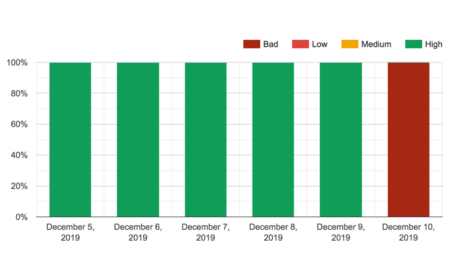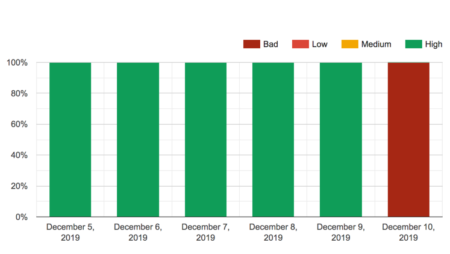http://feedproxy.google.com/~r/TheWritePractice/~3/lc-DVI5M0-U/
Handwritten notes are like sending a hug through the mail. They have personality and character, attributes a computer screen will never have. Let me show you why, when, and how to write a thank-you note.
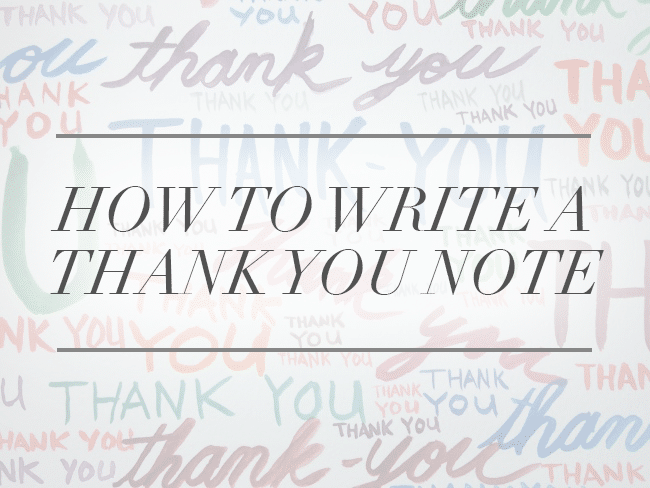
Need some quick advice? Here are the nine steps to write a thank-you note. Read on for a thorough guide!
How to Write a Thank You Note
- Use nice paper or a card.
- Find a pen with ink that doesn’t bleed or smear.
- Begin, “Dear __________,” (insert person’s name).
- In the first sentence say, “Thank you,” and what you are thankful for.
- Write at least one sentence of appreciation for the act of kindness or gift.
- Say something nice about the giver.
- Write your closer, such as Regards, Sincerely, All my best.
- Sign your name.
- You don’t have to put your address on the inside of the card.
Those are the quick steps. Now read on for a longer guide.
Why You Should Write a Thank You Note
It is easier and quicker to send a text message, an email, or a voice message to say “thank you.” However, if the purpose of the thank-you message is to convey your deepest, most sincere gratitude, taking the time to carefully write a message by your own hand, and not your secretary’s hand, will mean more to the recipient than an instant media message.
When was the last time you wrote a thank-you note? A real thank-you note on a piece of paper that goes into an envelope with an address written on it and a stamp stuck in the upper right-hand corner?
Too long, right?! Let’s write one together today.
What Is a Thank You Note?
A thank you note is a short informal written message of thanks to another person for a specific action. Thank you notes are brief, often no more than five sentences.
The key word is brief. We are not talking about the changes in currency prices or the bird call of a painted bunting here. If you want to write about your summer activities or about how many litter boxes you have, write a letter instead.
Joe Bunting wrote an article about writing letters, which you can read here: What Letter Writing Can Teach Us. But a thank-you note is not a full letter.
Why You Should Send a Thank You Note:
- You should send a thank-you note because my mother said it is a good idea.
- To connect with another person.
- Send a thank-you note because you want to say thank you.
- The biggest reason to send a thank-you note is because you are a kind, considerate person. And you always want your friends and acquaintances to know how much you appreciate them.
- Because you are thoughtful.
There is simply nothing as personal as a handwritten note. In a stack of bills and flyers, it’s a treasure in a sealed packet, full of promise and potential. —Dan Post Senning
Supply List for Thank You Notes
Before you begin, make sure you have all of the following on hand:
- Notecards or stationery.
- Stamps
- An address.
- Pens.
- A few minutes of your time.
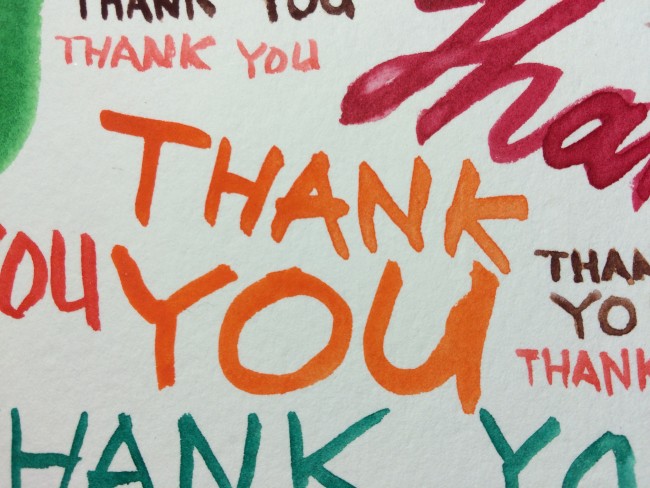
9 Steps to Write a Thank You Note
Writing a thank-you note might sound intimidating, but it is actually quite simple when you follow these nine steps.
1. Use nice paper or a card.
What is nice? Hmmm . . . a standard piece of printer paper, eight and a half by eleven, and an envelope are nice and acceptable. Personal stationery or a plain set of notecards is also nice.
What is not nice paper? A piece of paper ripped out of a notebook with a coffee stain on it, the back of your grocery list, or the back of a power bill would not be considered nice stationery.
2. Use a pen.
Your best choice is one with ink that doesn’t bleed or smear.
3. Begin “Dear __________,” (insert person’s name).
Check the spelling of the person’s name. If Margaret wants to be called Margaret, don’t call her Maggie. At least Maggie is not named after a non-stick spray like my name.
If you are on a first-name basis, call the person by their first name. If you don’t know the person very well, or they are “The Big Cheese” in a company, use Mr., Ms., or use the full name.
Keep the salutation polite and friendly. “Yoh” or “Hey” or “What’s up?” might work with your college roommate, but it is a bit casual for a business or professional thank you note. And don’t “Hey” your great aunt. Address the card “Dear Aunt Margaret,” not “What’s up, Maggie?”
Sigh, I am being a bit bossy. Who am I to tell you what to call your Aunt Margaret?
Only you know your relationship with your dear aunt. Please address the card in the same manner you talk to her. Which I hope is always polite and respectable.
4. The first sentence should have the words “thank you” in it.
And say what you are thankful for. Be specific.
Thank you for the beautiful sweater. Thank you for introducing me to your editor. Thank you for being the best friend I had in grade school. Thank you for being the best mommy in the world. Thank you for cleaning my seven litter boxes. (I can dream. Right?)
5. Write at least one sentence about how much you appreciate the gift.
Thank them for their gift of ten kittens, or tell them how much their act of kindness meant to you. This sentence makes the note more personal.
6. Say something nice about the giver.
For example, tell them you are looking forward to seeing them the next time you are in New Orleans. Or tell them how you wished you lived closer so you could help them shovel their driveway.
7. Write your closer, such as Regards, Sincerely, All my best.
These are all polite and not too informal. “Chow baby” is too informal, and “chow” is actually spelled “ciao.” Don’t use the word “love” unless you actually love the person. Signing an email “xo” might give the recipient the wrong idea.
8. Sign your name.
Use legible handwriting. This is not a prescription; it is a thank you card.
9. You don’t have to put your address on the inside of the card.
Remember, this is not a letter, it is a note. Please put your return address on the envelope. Write clearly.
//platform.twitter.com/widgets.js
“
Handwritten notes are like sending a hug through the mail.
When to Send a Thank You Note
Not sure when a thank-you note is appropriate? Here are six times to send a thank-you note:
1. When you receive a present.
Whether the present comes in the mail or in person, remember to send a thank you note in response.
2. When someone introduces you to someone else.
If someone helps you connect with someone new, send them a thank you note to show your appreciation for their kindness.
3. After you interview for a job.
Yes, send a handwritten thank-you note after a job interview. The handwritten note will help you stand out in a mass of interviewees.
However, according to an article by Molly Triffin on Interview Etiquette in Forbes, you should send a thank-you email to everyone you met in the interview process within twenty-four hours. Managers make quick decisions, and your written note might arrive after they have already made a hiring decision.
So, I suggest do both. Send a handwritten note and an email.
4. For an act of kindness.
When your mother comes and helps you pack up your house when you move from Minnesota to California. And then again five years later when you move from California to Pennsylvania.
Yes, even thank your mother. May no kindness go unthanked.
5. For a huge act of kindness.
When someone comes and cleans all your seven litter boxes without being asked. That hasn’t happened yet. But if it does, I will mail a handwritten note.
6. For friendship.
Send a thank-you note to a dear friend because you want them to know how much their friendship means to you. You realize life is precious, and you don’t want to get hit by a bus and not have them know you valued the friendship.
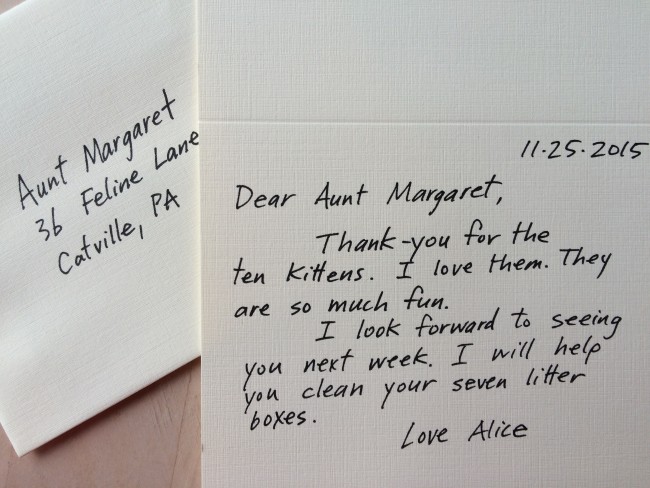
The Six Biggest Thank You Note Rules You Should Never Break
There are six unbreakable rules when writing thank-you notes:
1. Don’t ask for anything.
Never, never, never in ten million years ask for something at the end of a thank-you note.
Thank you, and, oh by the way, can you do this for me _______________. This is a big NO will a capital N and a capital O. Here is an example of what not to do.
Dear Mr. Faraday,
Thank you for introducing me to the President of your company. I appreciate your kindness in helping me meet Mr. Wise Sage.
I have enclosed a copy of my manuscript. Will you please read it for me and give it to the editor in charge of acquisitions?
Sincerely,
Pat Asksfortoomuch
2. Don’t tell the person you hated the gift and want to return it.
3. Don’t send a printed form letter with your signature printed at the bottom.
4. Don’t have your secretary write your thank-you cards for you and then you sign the note. I don’t care if you are the President of the Company. Write your own notes. The only way you can get out of this is if you don’t have hands.
5. If you spell a word wrong, don’t cross it out and keep writing. Get a new card and start again.
6. My husband said, “Don’t use profanity.”
Do you write thank-you notes? How do you feel when you receive one? Please tell me in the comments. I always love to hear from you.
PRACTICE
For today’s practice, take fifteen minutes to write a thank-you note. Get a notecard, or a piece of paper and write a thank-you note. Then put it in an envelope and mail it.
You don’t have to share the contents of your thank-you note here, as it might be personal, but please share that you wrote the note.
If no one has given you a gift in a box with paper and a bow, think of someone who has given you their time, has offered advice, or has supported you with encouragement, then write them a thank-you note.
xo
Pamela
The post How to Write a Thank You Note (a Real One) appeared first on The Write Practice.

